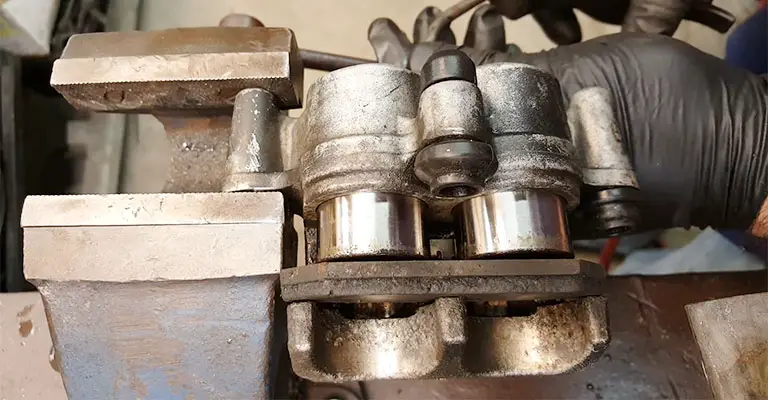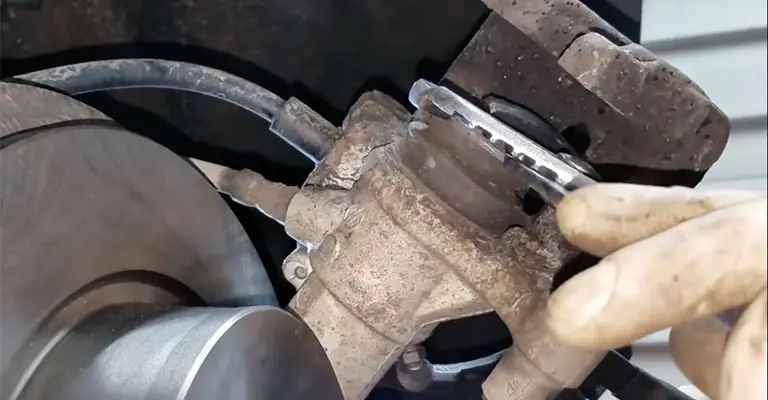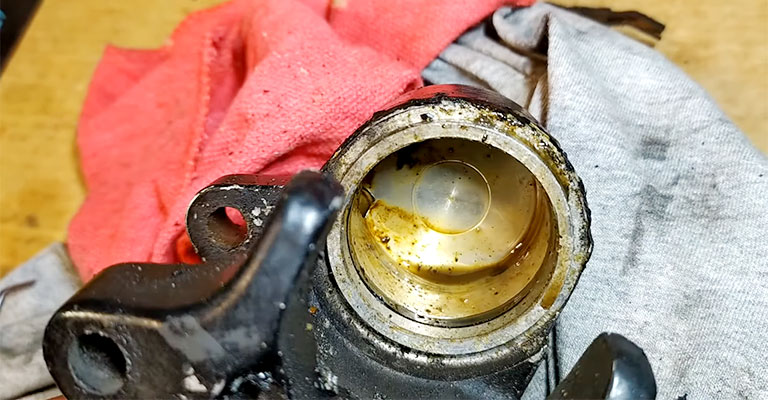Most probably your brake fluid is too old and water-contaminated, which stops it from easily flowing through the system. Or, the caliper itself might be damaged and in need of replacement.
If the brake caliper piston is not retracting, the brake pads may be sticking to the rotor. To fix this, clean the brake pads and caliper with brake cleaner and sand the pads with sandpaper. If the pads are still sticking, replace them.

Brake Caliper Piston is Not Retracting
Brake calipers are crucial to a car’s braking system. When they hit the brake pads, they slow your car. It’s important that they work well to prevent accidents caused by defective brakes. If your caliper pistons don’t retract after use, there are several possible causes.
Brake Caliper Piston

One part of your car’s braking system is the brake caliper piston. The brake pedal pushes the piston, which forces the brake pads up against the rotor and slows or stops the vehicle when you release the brake. The brakes may drag and become prematurely worn out if the piston isn’t retracting.
Unless it retracts
There are several issues that can arise when the brake caliper piston fails to retract. One reason is that it may make your brakes malfunction, which is hazardous. Additionally, it may result in brake fluid leaks and premature brake pad wear. You should act quickly and have your brake caliper piston fixed if you’re having any of these issues.
Indicators of the issue
If your vehicle stops more slowly than usual, you could discover that your brake pedal seems spongy. By removing the wheel and looking at the caliper, you may determine whether or not your brake caliper piston is retracting as it should.
Your brake pads may be rubbing on the rotor if the piston is extended, which could be a sign of a brake problem.
Why Is My Brake Caliper Piston Not Retracting

The brake caliper piston may not be retracted for a number of reasons. The brake fluid is usually too old and water-contaminated, which stops it from easily flowing through the system.
The caliper itself might be damaged and in need of replacement, which is another possibility. Regardless of the source, this must be fixed immediately because it could become a bigger issue later.
Solutions to Brake Caliper Piston Not Retracting
Several various problems can be the cause of your brake caliper piston not retracting. Rust or corrosion is the most frequent cause of the piston being stuck in position.
You’ll have to take the brake caliper off in order to remedy this and use a wire brush to clean the piston. You may need to replace the piston if it has significant damage.
Clean The Threads
Cleaning the threads should be your first priority if your brake caliper piston is not retracting. Brake fluid and other debris can accumulate on threads over time, making it challenging for the piston to move.
Use a toothpick or wire brush to remove any debris from the threads to clean them. To further aid in the process of loosening things up, you could also wish to use WD-40 or another lubricant.
Neutralize the Piston

Resetting your brake caliper piston is the thing you should do if it isn’t retracting. The brake pedal may typically be used to accomplish this several times. If it doesn’t work, you may need to remove the caliper and press the piston back into its housing with a C-clamp or another similar tool.
In Case of Need, Change the Caliper Casing
The brake pistons and pads are secured in place by the caliper shell. It is necessary to replace the caliper case if it has been harmed.
- Before removing the old caliper shell from the brake caliper, it must first be unbolted.
- Next, thoroughly clean the region where the new casing will be placed of any braking fluid or other debris.
- After that, use fresh bolts to install the new casing by lining it up with holes for the fasteners.
Once More, and Then Test
You might not have cleaned everything as thoroughly as you initially believed. The caliper should be disassembled and cleaned once more, being careful to pay attention to any places that might have been neglected the first time. Examine it after reassembling it to make sure the piston retracts as intended.
The Expense of Fixing the Problem
Your vehicle’s make and model will determine the price of the new brake caliper, which will range from $30 to $200. Paying for labor will also be necessary; the hourly rate will be about $100. For the entire repair of a brake caliper that won’t retract, budget between $130 and $300.
Consult a Dealer or Mechanic for Assistance
It’s preferable to get aid from a repair or dealer if you’re having problems getting your brake caliper piston to retract. They will be in a position to examine your car and determine the issue. In the majority of cases, they can fix it right away and get you back on the road. However, if the issue is more significant, the caliper or other components of the braking system may need to be replaced.
FAQ
How do you fix a stuck brake caliper piston?
Ans: If your brake caliper piston is jammed and won’t retract, try these solutions. First, make sure the pads aren’t jammed and the caliper is aligned. Hammering the piston checks for movement. If that doesn’t work, try a C-clamp.
Can I replace the brake caliper piston myself?
Ans: The brake caliper piston replacement may be doable on your own, but it’s not a task that the typical DIYer should attempt. There are a few possible reasons why the piston isn’t retracting properly.
- First, make sure the area around the piston is free of any buildup or debris that might be obstructing its motion.
- Check the amount of fluid in the master cylinder and whether the caliper slides are not seized next.
- If every one of these items is in order, it may be necessary to replace the piston if it is damaged.
Is it safe to drive with a stuck brake caliper piston?
Ans: It’s safe to drive even with a stopped brake caliper piston. The defect will cause the brakes to fail, therefore it’s unsafe to drive without fixing it. Check the brake fluid level if a caliper piston is jammed. If it’s low, fill it up. Changing the caliper piston or bleeding the brakes may fix the issue.
How often should I check my brake calipers for sticking?
Ans: A minimum of once every month, you should check your brake calipers for sticking. Greater still is frequent checking. If your brake calipers start to stick, you need to fix the issue immediately. Future problems could become more severe if you ignore them.
Last words
It’s possible for brake pad material to collect on the piston, for the piston to stick or freeze, or for a broken seal to prevent the piston from retracting in your brake caliper. You must take apart the caliper and clean or replace the piston. This basic repair can be done by most people. If you’re not confident fixing brakes, leave it to a pro.
Leave a Reply